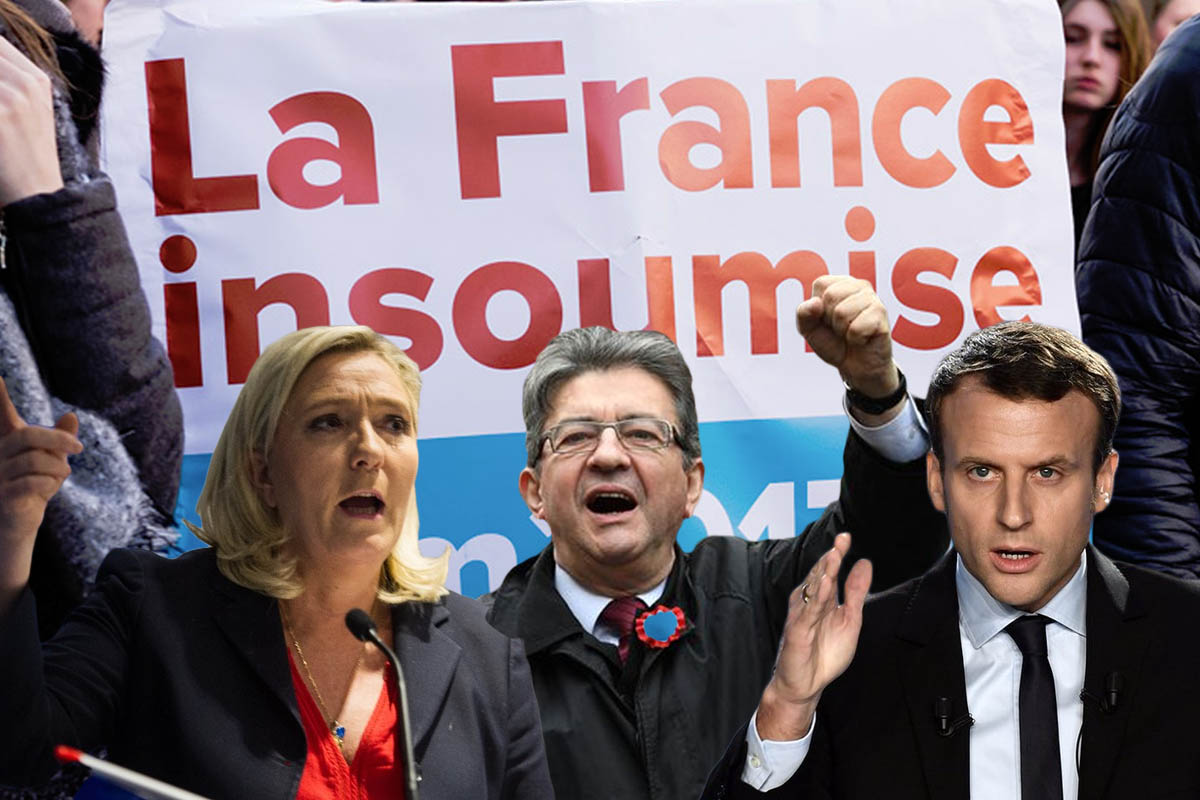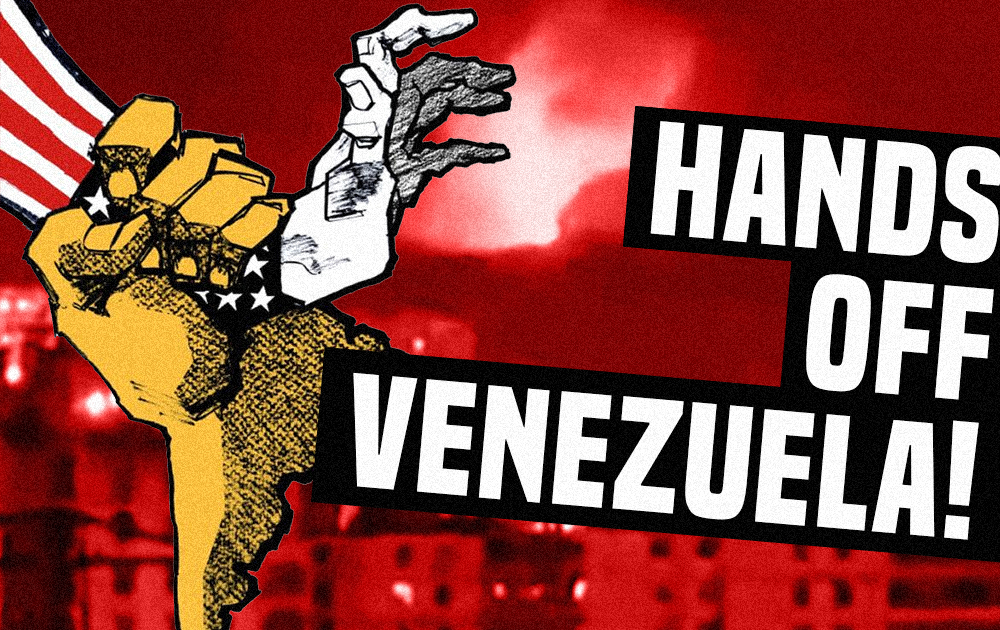After months of turbulent campaigning, the drama of the first round of the French presidential elections has come to a close, with Macron and Le Pen left to face each other in the run-off. Most notable in these elections was the unprecedented collapse of the traditional parties and the rise of the radical left candidate Jean-Luc Mélenchon and his “Rebellious France” movement.
After months of turbulent campaigning, the drama of the first round of the French presidential election has come to a close, with Emmanuel Macron and Marine Le Pen left to face each other for the second round.
The outcome of these elections are unprecedented in recent history. For the first time since the creation of the Fifth Republic in 1958, indeed since the end of the Second World War, neither of the mainstream Socialist or Republican parties have made it through to the final round. This breakup of the old order is a direct result of the crisis of capitalism, which is producing instability everywhere, as parties and programmes are put to the test as never before.
In France, as everywhere else, the bill for the crisis has been presented to the working class and youth – first by the Republican Party under Sarkozy and, more recently, by the so-called “Socialists”.
The “Socialist” Party under François Hollande won a landslide victory in 2012 on a promise to reverse the austerity of the Republicans. However, once in power they did the opposite – carrying out massive attacks on the workers and youth in the interests of the richest in society – the capitalists and bankers.
Through this betrayal, the “Socialists” dug their own grave. Becoming the most unpopular president in modern French history, Hollande declined to even stand for re-election. However, this was not enough to save the party, which is now so discredited that their candidate, Benoȋt Hamon, scraped only a miserable 6.4% of the vote.
François Fillion, the favourite candidate of the right-wing Republicans, failed also to make the second round. In normal times, this would have been his election to lose. However, having based his campaign on restoring “high ethical standards” to French politics, his breath-taking hypocrisy was revealed when he was placed under formal investigation following allegations he had embezzled €880,000 by employing his family in fake parliamentary jobs.
What’s more, his austerity programme of cutting 500,000 jobs and €100bn from public spending, as well as ending the 35-hour working week, raising the retirement age, and scrapping nearly all of the labour code – although necessary from the point of view of the capitalists – was hardly going to inspire millions of workers.
With both the “Socialists” and Republicans in crisis, all attention fell on candidates outside of the traditional parties. On the right, the racist Front National (FN), led by Marine Le Pen, campaigned on a nationalist and xenophobic programme of “France for the French” – promising to close France’s borders, seek an exit from the EU, and give preference to French workers with regards to jobs, welfare, and housing.
However, despite the fascist roots of the FN, Le Pen’s victory in the first round (receiving 21.5% of the vote) does not indicate a move by the French to fascism, but a desperate attempt by a layer of the downtrodden to find a way out of the crisis.
The FN’s nationalist poison was able to gain an echo amongst a layer of French workers, particularly in the northern “rust-belt” areas, precisely because of the attacks of the bosses and the betrayal of the reformists of the Socialist Party in accepting them. The failure of the ruling “Socialists” to alleviate any of these problems has led a layer to turn to nationalism in despair.
Cutting across this from the left, however, was Jean-Luc Mélenchon and his “Rebellious France” movement, which fought a bold, militant campaign attacking the rich. Beginning as a complete outsider, his programme terrified the establishment by gaining massive support amongst a layer of workers and youth, resulting in him coming just 1.9% shy of beating Le Pen to reach the final round.
Although the ruling class were jubilant that their man Macron, the former Rothschild banker, came top in the first round, it is by no means certain that he will win the presidency. His pro-business programme of €60bn spending cuts and job losses could lead to high levels of abstention, as many workers will be disgusted by both him and Le Pen. Already protests have been seen in Paris against the “choice” facing French workers and youth of Le Pen or Macron.
The task now for the French Left is to strengthen the Rebellious France movement, in order to fight whoever wins the presidency on the 7th May. Neither the liberal Macron nor the racist Le Pen offer any future for French workers. Instead, the only way out of the crisis of capitalism is to build a mass movement of workers and youth, armed with a socialist programme to take power from the bosses and billionaires.
The brute and the banker go to the second round – Mobilise in the streets and for the legislative elections!
 This is a statement by Révolution, the French section of the International Marxist Tendency, issued as soon as the results of the first round of the presidential election were known.
This is a statement by Révolution, the French section of the International Marxist Tendency, issued as soon as the results of the first round of the presidential election were known.
The results of the first round of the presidential election opens up a new phase of the political crisis in France. As in April 2002, the second round will be between the right and the far right. But much has changed since then. The economic crisis of 2008 has taken place. The probable victory of Emmanuel Macron, in two weeks time, will not lead to the relative political stability that Chirac benefited from in the wake of his victory in May 2002. The realignment of the whole political scene opens up a period of major uncertainty and instability. The legislative elections in June will be the first illustration of this. There is no guarantee that they will give the new Head of State a strong parliamentary majority.
The capitalist class, its politicians and media outlets are all relieved: they avoided “the worst”, from their point of view, namely Jean-Luc Mélenchon going into the second round. Now they are going to form a vast “republican” chorus calling for a vote for Macron, to “block the Front National.” Many “left-wing” politicians will advance the same slogan.
We reject this because it is absurd and counterproductive. It is the crisis of capitalism, mass unemployment and the reactionary policies of successive governments that explain the growing success of the “anti-system” demagogy of the Front National (FN). Macron proposes to pursue and aggravate the policy of austerity and attacks carried out by Hollande and Sarkozy: the massive destruction of civil service jobs; destruction of the Labour Code; dismantling of public services; tax breaks and subsidies of all kinds for the benefit of the big capitalists, etc. Throughout the campaign, Macron hid his programme under a “centrist” veil and many hollow words. But he is entirely devoted to the interests of the ruling class, which demands a drastic policy of austerity.
The FN is a dangerous enemy that must be fought. But we do not fight a fire by voting for the arsonist. The labour movement must fight the FN with its own methods and on the basis of a radical left programme that tackles the root of the problems: the control of the economy by a handful of extremely wealthy parasites. In the days to come, the political and trade union organisations of the labour movement must massively mobilise in the streets against the right and the extreme right. May Day must take place under the flag of the fight against the reactionary programmes of Le Pen and of Macron. Union leaders should put on the agenda a 24-hour general strike.
Finally, we must mobilise to give the Rebellious France the widest representation in the National Assembly in June. The progression of Macron and Le Pen to the second round must not overshadow the major event of this presidential election, namely the enormous success of the campaign of Jean-Luc Mélenchon. His performance is the continuation of a series of upheavals that have recently marked the European (SYRIZA, Podemos, Corbyn) and American Left (Sanders). This is an international phenomenon with a clear meaning: a growing number of young people and workers are looking for a left-wing alternative to the crisis of capitalism, and to politicians who have been in power for decades without changing anything, or changing it for the worse. The deep crisis of the capitalist system leads to political polarisation – to the right, as shown by the FN result, but also towards the left.
The electoral collapse of the Socialist Party (PS) is a striking illustration of this. Benoît Hamon has paid the price for the labour law and austerity policies of the Hollande government. He also pays for his own moderation and two years of participation in government. At the end of the PS primaries, Hamon could have relied on his clear victory to launch an offensive against the right wing of his own party. He preferred to seek a “central” position. As a result, he found himself in the middle of a chasm.
Mélenchon’s campaign has generated enormous enthusiasm among large sections of the population. In particular, the number of young people present at the meetings and rallies of the Rebellious France was impressive. This radicalisation of the youth – which is also an international phenomenon – will have profound and positive consequences for the future of the Left. In this respect, one of the key tasks in the coming months is to organise the mass of the “rebellious” into a democratically structured party. This is the best way to consolidate and develop the Rebellious France movement, and to attract under its banner the most militant elements of the youth and of the working class.
For mass mobilisations in the streets against Le Pen and Macron!
For a 24-hour general strike!
Mobilise and organise for a “rebellious” National Assembly!






